 |
 |
 |
 |

 |
 |
 |
 |


Rosa was born January 09, 1912 in Amsterdam, Holland. Her mother, Lilly Querido, a Parisian, was known as "Mimi" because of her exquisite renditions of Puccini Operas, for which she was offered a contract with the N.Y. Metropolitan Opera.
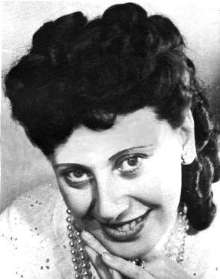
Miranda
Click for larger image
Her father, Aaron Baruch, was a dentist and was generally better known as Arnold. To his grandchildren, he was known as Opa, the Dutch word for grandfather. Opa was also a music critic and a collector of stringed instruments. He encouraged Rosa's younger brother, Marcel, to study the violin, which Marcel did, with the success of a budding virtuoso.
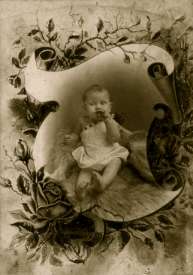
Rosa Lili Odette Rodrigues Baruch de la Pardo,
age 1 1/2 years
Click for larger imageRosa was a very beautiful child, with large blue eyes, and soft wavy brown hair. She also showed early promise as a musician with her rapid acquisition of piano technique, a highly discriminating ear, and a beautifully fluid voice of great range and flexibility.
When Rosa was ten years old, she began to accompany her mother at the piano on some local concert recitals. Though Rosa, later, possessed an extraordinarily sweet voice, she did not appear professionally as a singer, because of her young age. Rosa was also reluctant to compete against the brilliant vocal career of her mother, Mimi.
Not too much is known about the period of her youth except that at around the age of fourteen Rosa was introduced to Bram de Miranda, one of 5 children sired by Bram's father, Monne, a renowned and respected Amsterdam, City councilman, and Selly, Monne's lovely wife.
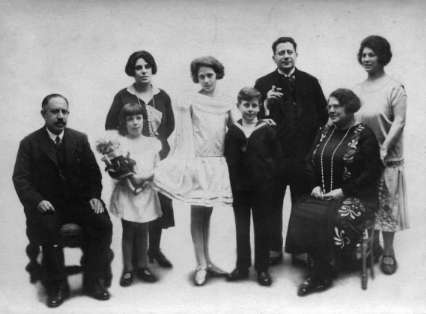
Miranda's family, circa 1925.
Miranda's maternal grandfather, seated, left; Rosa (later known as "Miranda") standing, center, wearing a white dress, 4th from left; her younger brother Marcel, wearing sailor suit, fifth from left; Aaron ("Arnold") Baruch, her father, standing, with cigar; her maternal grandmother, seated, right; Lilli ("Mimi") Querido, her mother, standing, extreme right.
Click for larger imageIn high school Bram would help Rosa with Latin , and she would help him with French, which she also spoke fluently. Both Bram and Rosa also spoke German, English, and had some knowledge of Latin and Greek. Ultimately, through something of a family arranged union, the two were married when Rosa was 19 years old.
Rosa's marriage to Bram brought forth two children, Yvonne Olga, in 1933, and Marcel Raymond in 1935.
This was a very tense time in Europe because of the rise of Nazi Germany. Bram was already the youngest lawyer to graduate from the academy but, possibly because of his age, he was not the recipient of many clients. He was fully aware, as were many others, of the rise of fascism during the early thirties. He assisted a growing Dutch resistance in many ways. He was a political activist, but was torn between staying in Holland, sensing an impending invasion, and going to the U.S. to be with wife and children in order to support them.
There were many family meetings to discuss how the arrangements of leaving Holland were to be made. Finally all were agreed, and with great tribulation at leaving her beloved homeland, but with the understanding that her parents and husband would join her later, Rosa, now age 27, fled from Amsterdam to the United States with her two children in September, 1939.
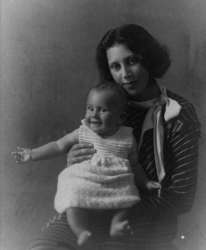
Miranda with Baby Yvonne
Click for larger imagePoland had already been invaded. The day after England declared war on Germany, the ship with Miranda and her two children departed from Holland. The risky voyage began with a terrifying trip across the English channel. There were no lights allowed on deck so as to elude any patrolling German aircraft. But their ship, the Statendamm, was constantly vulnerable to German submarine attack throughout most of the voyage across the Atlantic, a situation that added to the mounting tension of the trip. During the crossing, their ship picked up survivors from a torpedoed Polish ship, which greatly added to the crowded conditions. Miranda kept a special ration of food and children's clothing near her in the event of an evacuation. Rosa and her children were greatly relieved when the familiar landmark, the Statue of Liberty, finally came into view..
When Rosa and her two children arrived at Ellis Island, they were greeted by her French aunt, "Tante" Henrietta, and "Oncle" Edward, the brother of her father.
Marcel Jr. remembers sleeping for the first few nights at "Tantenriet's" Brooklyn apartment in one of the old steamer trunks. (He didn't speak French at age 3, so he thought that the appellation was one word.)
Within a few weeks, Bram arrived in the U.S. His ship had been the last one permitted by the authorities to leave Rotterdam, because of the danger to domestic ships. On the day for their scheduled departure, the grandparents were unable to leave because the authorities closed the docks. They remained behind.
Bram and Rosa set up a tiny apartment in Brooklyn, NY, and Bram, the Dutch attorney, went to work for an Import-export company. Rosa worked for a few years as a "housewife". The stress of getting her parents' letters censored, and stamped with a swastika, added to the tension of a young marriage foundering under Bram's minimal salary of $35 per week.
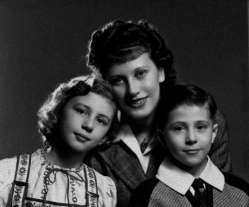
Miranda with Yvonne and Marcel
Click for larger imageIn 1942 Bram enlisted in the U.S. Army, eventually being placed in "Intelligence". A year later, he was honorably discharged for medical reasons which had not been discerned when he first enlisted.
Meanwhile, Rosa applied for work at the Office of War Information. Her English was also quite good by now. Coupled with her fluency in French and Dutch, it made her a good candidate to work on the Afrikaans desk, where they needed for Dutch speaking editors. The supervisor conducting the interview was a certain Josef Marais. (For information on Josef Marais' youth, CLICK HERE.) He was already recognized as a balladeer in the country of his birth, South Africa, and was acquiring a similar reputation in the U.S. through a series of radio broadcasts. But when Rosa met him, it had nothing to do with music.
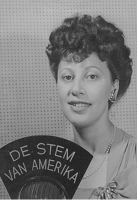
Miranda broadcasting on the Dutch Voice of America
Click for larger image
 |
 |
 |
 |